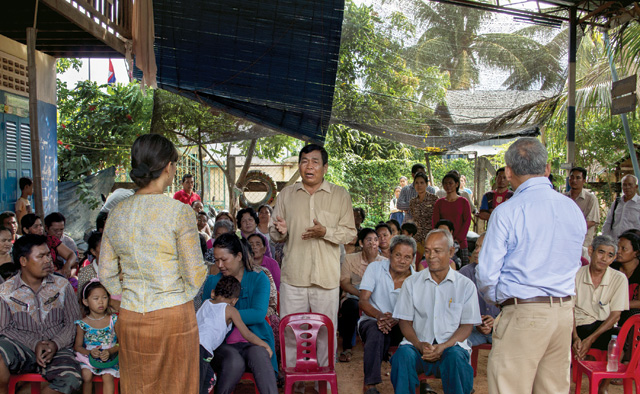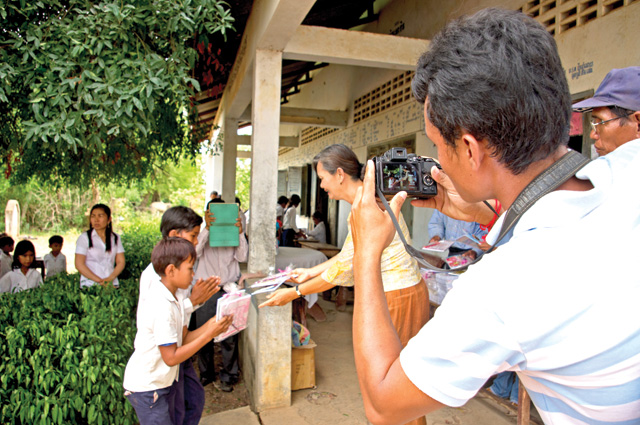Mu Sochua stood holding a thick wad of riel banknotes. “This is your money,” she told the 30 assembled villagers, as she waved her salary as an MP. “We are paid by the people to work for the people. You have the power. It’s our role to protect you.”
Dressed humbly in a bronze-coloured traditional samput skirt, pale blouse and flat shoes, she began to pace the earthen floor, questioning the villagers from a small commune in Cambodia’s northwestern Battambang province: “What is the role of an MP? Why do you think politics are important? What change do you want?” There was a nervous, school-like reticence. Nobody wanted to be the first to answer. Eventually, after some prompting by Sochua, one elderly man stood and admitted he wasn’t too sure what MPs do.
“Many people don’t understand politics because for too long the [ruling party] and its politicians never came to speak with the people,” she told me after the meeting. “That’s why I go to the people, listen to them and try to help. Politics is about the people.”
It is this brand of populism, as well as Sochua’s work in the fields of human and women’s rights, that has made her one of the most-respected politicians in Cambodia. She is a leading member of the Cambodia National Rescue Party (CNRP), the country’s largest opposition party, and is widely seen as untainted by the corruption that besmirches many in the Kingdom.

However, as a younger woman, this was never her intention. “I never thought about joining politics because my father always said that it’s dirty,” she recounts.
Sochua emerged from Cambodia’s civil society in the 1990s, opening the country’s first women’s rights NGO and advising the government on the same issue, before making the transition into politics.
“I went to the Fourth World Conference on Women in 1995 and heard Hillary Clinton say very clearly: ‘If you want to make genuine change for women, go into politics,’” Sochua remembered.
In 1998, she did just that. She was elected as an MP for Battambang with the royalist Funcinpec party, one of the few women in the country’s history to hold such a position, and wasted no time in her campaign for change. After being appointed minister of women’s and veterans’ affairs, she was instrumental in the passing of the Prevention of Domestic Violence Bill and in the fight against human trafficking and worker exploitation. In recognition of her work, she was shortlisted for the Nobel Peace Prize in 2005. Although she did not win, she has received countless other awards from international organisations over the years.
Her headfirst dive into politics, however, has not been without its difficulties. She has been arrested and imprisoned on several occasions, been personally sued by Prime Minister Hun Sen and more than once faced the ugly side of Cambodia’s male-dominated political landscape – the prime minister reportedly once referred to her as cheung klang (strong leg), an offensive term for women that has connotations of prostitution.
Last month, Southeast Asia Globe accompanied the 61-year-old on a hectic three-day tour of her Battambang constituency, visiting communities affected by illegal mining, forced evictions, alleged corruption from local government officials and outbreaks of HIV.
“I support development in Cambodia, but it must always benefit the people. Development that harms the people is not good development,” she explained.
On a visit to a small school in a rural village, she sidestepped a waiting crowd of children and teachers to check the toilet facilities as soon as she arrived. When asked why, she said that the conditions of toilets are often overlooked. “It’s a small thing to some people, but a lot of girls drop out of school when they hit puberty because of the state of toilets, or if there are no toilets, and the lack of education of girls in Cambodia is a massive problem,” she said.
Sochua says her interest in the education of women has much to do with her own background. Her mother, who she describes as the “anchor” of the family, only had three years of education herself and often studied alongside an adolescent Sochua. “When I was younger, I was not self-confident,” she remembered. She was, however, studious and naturally intelligent, which provided an avenue for her introversion. Today, the MP personally funds the education of numerous women around the country and sent her own three daughters to top universities in the US and UK.

“We have a culture of total obedience [in Cambodia], even oppression,” she said. “And this begins at an early age, at school. The headmaster in many schools has complete control, and the children only know what they are told to know. They are not taught to think for themselves, and this is very problematic for the country, especially for the girls… There is a long way to go to reach the goal of female participation in Cambodian society. Women have to leave their traditional roles and join politics or become professional women, but that is very difficult.”
A 2013 article in the Guardian noted that Sochua has “invited comparisons to [Myanmar’s] Aung San Suu Kyi for her bravery and outspokenness”. On the surface, the two women share much common ground. Both are respected female politicians in male-dominated countries; both have been nominated for Nobel Peace Prizes – although Suu Kyi won; both have been educated in the West, have educated their own children in the West and married Western men. (Sochua married US national Scott Leiper in 1984 when they were both working in a Thai border camp for Cambodian refugees.)
However, such a comparison does a disservice to the politicians and overlooks their individuality. For one, unlike Sochua, Suu Kyi nowadays spends relatively little time meeting the electorate. And, unlike Suu Kyi, Sochua has no desire to become premier of her country.
“I am sure that one day there will be a female prime minister of Cambodia, but I have no intentions of being it,” she said. “I’m happy and fulfilled when I’m with the people. We have been here [in Battambang] for three days, and it is being with the people that gives me the energy to continue.”
It is this connection, she says, that has done much to shape her political career. During her first election campaign in 1998, she was among the few politicians to travel deep into the rural districts of Battambang province that she describes as being “Khmer Rouge strongholds”.
“We went without any security and, at the beginning, many of the Khmer Rouge soldiers attempted to stop us entering the villages,” she recalled, adding that when the Funcinpec party started playing royalist music from their vehicles, the villagers came out to cheer. “They had waited a long time for the king.”
After spending weeks conversing with these villagers, she was able to secure their confidence and their vote. “I say, ironically, that I got my first seat from the Khmer Rouge,” she said with a wry smile.
For many politicians, such interest in the lives of ordinary people can appear forced and affected – a brief appearance, a ten-minute talk, a photo opportunity and then on to the next PR stunt. However, during the three days Southeast Asia Globe spent with Sochua, her connection and interest appeared completely genuine.
On one occasion, at the end of the frantic three-day tour, a meeting with a local community over water supplies was interrupted by an irate woman who waved a long bamboo stick and refused to quieten down. After the meeting, rather than return straight to her vehicle, Sochua spoke with the infuriated woman and accompanied her to her dilapidated wooden home. The woman, in her 50s, was a widower – her husband had passed away from Aids years ago – and her 18-year-old daughter had recently quit school to provide for the family. Sochua was able to persuade the young girl not to leave school and gave the mother an opportunity to vent her anger.

In her 20s, Sochua earned a master’s degree in social work from the University of California, Berkeley. She says this training has been invaluable to her political career: “It taught me to listen to people, not just to talk, and to understand the people I am trying to help more deeply.”
Indeed, not unlike a social worker, her voice often undergoes a rapid transformation, from intense and authoritative one moment to composed and serene the next. Interruptions from the crowd are not silenced. She tends to listen and then alter her speech to address the issue.
It is also immediately apparent that she assumes the role of matriarch to the younger women in her entourage, constantly advising and teaching, chastising them for playing on their phones too much or not listening to the people enough.
On one or two occasions, however, perhaps when she thought no one was watching, this composed, authoritative aura receded. While a guest on a local radio show, she sat next to three ageing boxing coaches she was working with to stop the demolition of a historic gym in Battambang city. As numerous callers came on air to support the campaign, she wiggled in her seat, punched the air and smiled broadly. Mu Sochua has clearly learned to relish even the smallest of victories.


